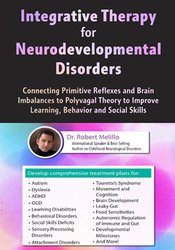

Motor, sensory, behavioral, academic, digestive, immune and autonomic dysregulation issues are all seen in various combinations and degrees in neurobehavioral disorders such as ADHD, Autism, learning disabilities, behavioral problems, and social skills deficits.
But, why? What is the link? Most experts believe that these disorders are connected to one another. How? In this recording, Dr. Melillo will answer these questions in the most practical way.
Based on 20 years of clinical experience and cutting-edge brain science, Dr. Melillo will teach you new and innovative therapy techniques that connect motor development to cognitive development, and examine the relationship to early milestones and retained primitive reflexes. You will learn to tie all of this together with the Polyvagal Theory, brain hemisphericity and a holistic understanding of how the brain and the hemispheres regulate everything. You will learn techniques and tools that translate into clinical success no matter what the condition or severity.
With the rise of developmental neurobehavioral disorders and the overwhelming wide spectrum of related symptoms, understanding the root cause of neurobehavioral and learning disorders is essential to successful treatment.
From this recording, you'll learn:
| File type | File name | Number of pages | |
|---|---|---|---|
| Manual - Integrative Therapy for Neurodevelopmental Disorders (5.31 MB) | 164 Pages | Available after Purchase | |
| Manual - Integrative Therapy for Neurodevelopmental Disorders - French (5.31 MB) | 164 Pages | Available after Purchase | |
| Manual for Modules 1-4 - Integrative Therapy for Neurodevelopmental Disorders - French (5.31 MB) | 164 Pages | Available after Purchase | |
| Manual - Integrative Therapy for Neurodevelopmental Disorders - Italian (5.31 MB) | 164 Pages | Available after Purchase | |
| Manual for Modules 1-4 - Integrative Therapy for Neurodevelopmental Disorders - Italian (5.31 MB) | 164 Pages | Available after Purchase |

ROBERT MELILLO, MS, MNeuroSci, DC, PhD (C) DABCN, FACFN, FABCDD, is a world-renowned expert in developmental functional neurology, brain imbalances, hemispheric integration and the diagnosis and correction of most neurobehavioral disorders and learning disabilities. He has graduate degrees in clinical rehabilitation neuropsychology, neurology, neuroscience, and chiropractic. Dr. Melillo is a prolific brain researcher, having authored five best-selling books, including Disconnected Kids, 50 peer-reviewed papers, and a major textbook Neurobehavioral Disorders of Childhood: An Evolutionary Perspective. He created Brain Balance Achievement Centers, which has approximately 150 centers and has helped tens of thousands of families.
Dr. Melillo has presented at numerous clinical and scientific conferences around the world and has taught his own course in a post graduate level for over 20 years. He is an associate professor of Developmental Disabilities at National University of Health Sciences, as well as cofounder and past president of the International Association of Functional Neurology and Rehab. Due to Dr. Melillo’s authority in the field, he has been featured in documentaries, appeared in thousands of radio and TV interviews, and hosts a TV show, radio show, and webseries.
Financial Disclosure:
Financial: Robert Melillo is cofounder of the International Association of Functional Neurology and Rehab. He is an associate professor at National University of Health Sciences. He is an author for Penguin Publishing and receives royalties. Dr. Melillo receives a speaking honorarium from PESI, Inc.
Non-financial: Robert Melillo has no relevant non-financial relationship to disclose.
Please wait ...